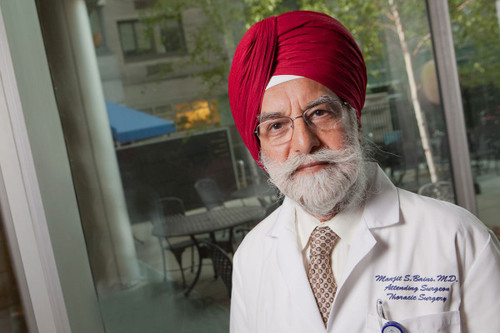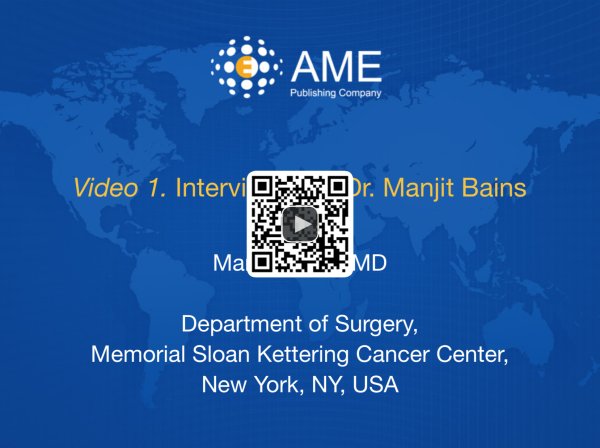Editor’s note
The 27th annual meeting of the European Society of Thoracic Surgeons (ESTS) was held on June 9–12, 2019 at the Convention Centre Dublin, in Dublin, Ireland. As the world’s top event in the field of general thoracic surgery, the ESTS annual meeting brings together thousands of experts and scholars from around the world to discuss the hotspots of thoracic surgery, update research progress, and share their experiences. The AME editorial team was with great honor to invite Dr. Manjit Bains to conduct a brief interview during the meeting.

Figure 1 Dr. Manjit Bains.
Expert introduction
Dr. Manjit Bains (Figure 1) has been a thoracic surgeon at Memorial Sloan Kettering Cancer Center for more than four decades. He has been devoted himself to caring for thousands of individuals with lung, mesothelioma, and esophageal cancers and preparing the next generation of medical professionals to handle these cancers with compassion and expertise—both in the clinic and in the operating room. He has been responsible for creating innovative techniques in the surgical treatment of thoracic malignancies, including chest wall reconstruction with methyl methacrylate prosthesis. He also holds an appointment at Weill Cornell Medical College as Professor of Clinical Cardiothoracic Surgery.
In addition to lecturing nationally and internationally, he is a member of nearly two dozen professional societies, including the American Association for Thoracic Surgery, the American Surgical Association, the American Society of Clinical Oncology, etc. He has contributed more than 150 journal articles on the role of multimodality therapy in thoracic malignancies. He received an honorary fellowship of the Indian Association of Cardiovascular Surgeons as well as the Weill Cornell Medical College Excellence in Teaching Award in 2007.

Figure 2 Interview with Dr. Manjit Bains (1).Available online: https://www.asvide.com/article/view/32896
Interview
CCTS: You have a lecture on “The perfect strategy” in the Chest Wall Working Group on the morning of Tuesday 11 June. Would you please give a summary on what is the perfect strategy?
Dr. Bains: One will get better results in making satisfactory diagnosis and choosing a treatment plan. Because some tumors like osteogenic sarcoma, rhabdomyosarcoma in children, will benefit or give us better results if they get preoperative neoadjuvant chemotherapy. During surgery, one needs to make sure that you’re resecting the tumor completely with adequate negative margins. And then the purpose of reconstruction is to provide the rigidity. And that will provide the function, and restore the function for the patient. And when you’re doing that, you also need to keep in mind that the prosthesis are the materials used for reconstruction that is resistant to infection and is radiolucent, so that you can get X-rays to determine what’s going on with the lungs.
CCTS: What should a surgeon do for better decision if he/she has no absolute evidence or perfect strategy for a difficult case/situation?
Dr. Bains: One needs to make sure that you have all the facts about the patient’s illness. You should be comfortable and sharing them with your colleagues having a discussion with your colleagues. And they may be able to give you some ideas because they may have gone through the same decision-making. And last but not the least, you really need to be sharing your dilemma with the patient and the patient’s family. And your decisions should be jointly made by the patient and by you.
CCTS: What should a young surgeon do to prepare for a successful career?
Dr. Bains: I’m assuming that the young surgeon has been diligent in studying, in learning about thoracic surgery and then he needs to have a mentor who can help him, guide him and support him during his development as a mature thoracic surgeon.
The young surgeons need to be honest with their decision-making; they need to make every effort to learn about the problems. Nobody knows everything. Even after forty years of being a thoracic surgeon. I still need to read and learn about the disease process. And I’m very comfortable in going on discussing with some of my colleagues and getting their opinion. It’s always a good idea.
CCTS: Should young surgeons highly focus on and specialize in one area or try to dabble in as extensive areas as they can?
Dr. Bains: It’s always nice to focus on a particular problem. And if they can continue focusing on it, they can become the future experts.
CCTS: Under what kind of condition, would you agree with operating a resection on a patient?
Dr. Bains: First of all, before you embark on any of the sections, you need to be sure that you’re making the right decision. You’re keeping into account that what you’re going to do is going to benefit the patient. You need to be sure that the risk benefit justifies you’re taking very aggressive and possibly a risky procedure. I have done very radical procedures, but had to really go to that talk process. And only then having been very upfront with the patients, letting them know what the consequences of their undergoing radical operation means, only then I proceeded with the operation.
CCTS: Why did you choose to be a surgeon?
Dr. Bains: Well, I always wanted to, first of all, do something in medicine to help people. And as I progressed in my training, I realized that I liked to do things with my hand and that I’m reasonably good at learning doing procedures. I like to do things rather than just sit down and think and write.
CCTS: If you were not a surgeon, what would you like to choose as your career?
Dr. Bains: I would be an engineer. I like to do things with my hands. I like to fix things; I like to make things. My grandchildren always come to me, “Hey, can you do this for us? Can you make this toy for us?” And I love it.

